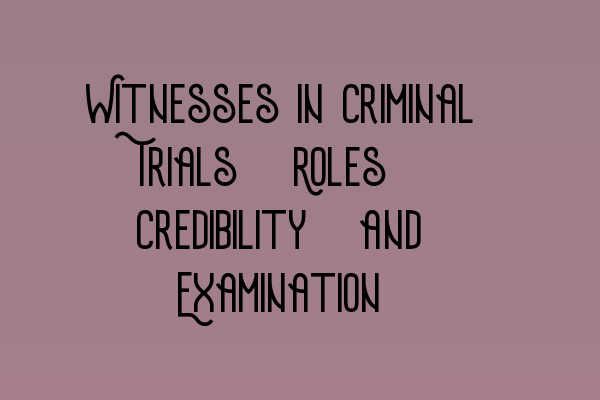Witnesses in Criminal Trials: Roles, Credibility, and Examination
When it comes to criminal trials, witnesses play a crucial role in the pursuit of justice. Their testimonies can make or break a case, and therefore, it is important to understand their roles, credibility, and the process of examination. In this blog post, we will delve into the world of witnesses in criminal trials and shed light on these important aspects.
The Role of Witnesses
Witnesses have the responsibility of providing evidence in court to support or refute the claims made by the prosecution or defense. Their role is to present factual information based on what they have observed or experienced. Witnesses can be victims, bystanders, experts in relevant fields, or anyone who has relevant information pertaining to the case.
It is important to note that witnesses are expected to be impartial and truthful in their testimonies. They should not withhold any relevant information or provide false statements. The credibility of witnesses is crucial for the proper functioning of the criminal justice system.
Factors Affecting Witness Credibility
The credibility of witnesses can be affected by various factors. These include:
- 1. Bias: If a witness has a personal interest or bias in the case, their credibility may be questioned. It is important to assess the potential influence of bias on the witness’s testimony.
- 2. Inconsistencies: Inconsistencies in a witness’s testimony can raise doubts about their accuracy and credibility. Discrepancies in details or contradictions with other witnesses’ accounts should be carefully examined.
- 3. Reputation: The reputation of a witness can also impact their credibility. If a witness has a history of dishonesty or unreliability, their testimony may be viewed with skepticism.
- 4. Mental state: The mental state of a witness can affect their ability to accurately recall events. Factors such as trauma, stress, or intoxication can impact the reliability of their testimony.
Examination of Witnesses
The examination of witnesses is a crucial part of the trial process. This involves questioning witnesses to elicit relevant information and test their credibility. There are two types of examination:
- 1. Examination-in-Chief: This is the initial questioning of the witness by the party who called them. The goal is to present the witness’s testimony and establish their credibility. It is important to ask open-ended questions to allow witnesses to provide their account without leading or suggestive questions.
- 2. Cross-Examination: This is the questioning of the witness by the opposing party. The purpose of cross-examination is to challenge the witness’s credibility, expose inconsistencies, and explore alternative interpretations of events. Cross-examination requires careful preparation and effective questioning techniques.
It is essential for solicitors and barristers to master the art of examining witnesses in order to present a strong case and ensure justice is served.
